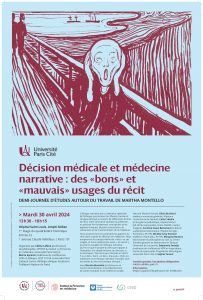
Martha Montello, spécialiste de littérature et d’humanités médicales, est l’une des plus éminentes représentantes de l’éthique narrative et de la médecine narrative. Elle l’enseigne notamment au Centre de bioéthique et au Département de santé mondiale et de médecine sociale de la Harvard Medical School. Pendant 20 ans, elle a été professeure invitée d’ éthique narrative à l’université de Pavie, en Italie. Elle enseigne actuellement à l’ « Università cattolica » de Rome. Parmi ses publications, elle a co-dirigé, avec Rita Charon, l’ouvrage : Stories Matter. The Role of Narrative in Medical Ethics, Routledge, 2002 et dirigé le numéro spécial du Hastings Center Report : Narrative Ethics : the Role of Stories in Bioethics, vol. 44, issue 1, 2014. Elle est rédactrice en chef de la revue Perspectives in Biology and Medicine (Johns Hopkins University Press).
> > PROGRAMME
> > INSCRIPTION
⇒ Mardi 30 avril 2024 (13h30-18h00) Hôpital Saint Louis, Salle Milian (Quadrilatère historique, entrée 23, 1er étage), Paris
⇒ En ligne : https://u-paris.zoom.us/j/86260685676?pwd=cDlFSFBVOG5UdE9Xb0VtTzRPSno5dz09
La médecine narrative apparaît comme un courant d’études et de pratiques d’une très grande diversité, actuellement toujours en pleine expansion. L’éthique narrative, quant à elle, est un domaine spécialisé de l’éthique qui promeut la réflexion morale et l’analyse éthique au travers de différentes formes de récit. Cette rencontre souhaite présenter plus spécifiquement l’éthique narrative, préciser ses fondements conceptuels et ses apports cliniques, illustrer sa puissance de subversion et de transformation de la médecine.
Nous examinerons en particulier les apports du récit dans la prise de décision en médecine. Dans quelle mesure les éclairages particuliers, et la « cartographie » inédite que nous offrent les récits sur les vies et les mondes moraux des personnes malades et des soignants, nous aident à prendre des décisions difficiles et à orienter la prise en charge dans une direction plus conforme au respect de chacun ? Et pourquoi ? Est-ce la possibilité de faire varier les points de vue sur une situation donnée ? Ou bien une compréhension de ce qui importe pour autrui ? Ou encore la possibilité d’asseoir la légitimité de différentes positions et manières de percevoir les enjeux d’une situation complexe ?
Pour aborder ces questions, nous souhaiterions analyser le concept même de « récit » et ses usages, « en miroir » pour ainsi dire, afin d’explorer les points aveugles de l’éthique narrative. On tentera de répondre à ces interrogations : qu’est-ce qui n’est pas un récit ? Ou qu’est-ce que le propre du récit par rapport à l’anecdote, à la simple histoire, au discours, à la chronique ? Y a-t-il des « bons » et des « mauvais » récits en médecine et en éthique narrative ? Quelles seraient les limites du récit en pratique clinique ? Cela nous permettra également de répondre aux critiques de l’approche narrative, en en renforçant les avantages spécifiques.
Martha Montello, a specialist in literature, is one of the leading experts in medical humanities, narrative medicine, and narrative ethics. She teaches at Harvard Medical School’s Center for Bioethics and Department of Global Health and Social Medicine. For 20 years, she was visiting professor of narrative ethics at the University of Pavia, Italy. Currently, she is on faculty at Universita Cattolica in Rome. With Rita Charon, she co-edited the collective volume Stories Matter: The role of narrative in medical ethics, Routledge, 2002 and edited the special issue of the Hastings Center Report: “Narrative Ethics: the role of stories in bioethics”, vol. 44, issue 1, 2014. She is Editor of the journal Perspectives in Biology and Medicine (Johns Hopkins University Press).
Narrative medicine is an emerging and highly diverse field of study and practice, which is currently still expanding rapidly. A subset of the field, narrative ethics is a specialized area of ethics that focuses on moral thinking and analysis through stories. The aim of this meeting is to discuss narrative ethics specifically, to clarify its conceptual foundations and clinical contributions, and to illustrate its power to subvert and transform medicine.
In particular, we will examine the specific contributions of narratives to decision-making in medicine. To what extent can the particular insights and unprecedented « cartography » offered by stories about the lives and moral worlds of patients and healthcare professionals help us to make difficult decisions and care for patients in a more respectful and effective way? How do narratives provide this precious advantage? Is it the possibility of allowing different points of view on a given situation? Or an understanding of what’s important to others? Or the possibility of establishing the legitimacy of different positions and perceptions of what is at stake in a complex situation?
To address these questions, we would like to analyze the very concept of « narrative » and its uses, « in a mirror-like » way, so to speak, and explore the blind spots of narrative ethics. We will attempt to answer the following questions. What is not a narrative? What is exactly a narrative as opposed to an anecdote, a simple story, a discourse, a chronicle? And are there « good » and « bad » narratives in medicine, and if so what are they? What are the limits and advantages of a narrative approach to ethics and clinical practice? We trust that this perspective will enable us to better highlight the specific benefits of the narrative approach and respond to criticisms.
